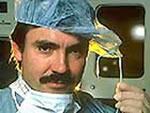| << To Blog Home >> | |
|
|
March 19, 2006 Blame the Messenger: Reporting on Plavix and
Aspirin
Those pesky patients, putting their lives in danger by misinterpreting the following finely-nuanced reports that appeared nationwide only hours after the CHARISMA results were made public last Sunday.
My point here is that how could patients who have been prescribed Plavix and aspirin by their cardiologists NOT be terrified by these headlines? Especially when the widely-reprinted AP story begins:
As many doctors recommend? Good reason to stop? So is the message here that your doctor has made a terrible mistake by giving you a deadly mix of drugs and you'd better take this matter into your own hands? When I saw the news, I immediately realized the problem -- not only were the headlines inflammatory (medical pun intended) implying some type of toxic interaction between Plavix and aspirin, but the articles themselves left out a critical piece of information. The CHARISMA study was about expanding the applications for Plavix; it had nothing at all to do with the many patients who currently take these drugs as per FDA-approved indications -- patients for whom the drug combo is of proven benefit. And life-saving benefit. For years it's been known that Plavix (clopidogrel) and aspirin are essential for stent patients to take to prevent blood clotting inside a stent, called stent thrombosis, an incident which is fatal more than 1/3 of the time!! So by Monday noon I had posted our own Public Health Alert, also written a warning at our very popular Plavix and Aspirin Discussion Forum and ran a Google Ad, directing people to these pages. At least Internet searchers would get the right information: stent patients, don't stop taking your meds without talking to your doctor. As the week went on, I found no other place where this vitally important caveat for stent patients appeared. I couldn't understand how so many reporters could be at a major cardiology meeting and not be aware of these fundamental medical facts. I also saw the traffic on Angioplasty.Org increase explosively by 50%, with the number one search term being, you guessed it, "Plavix and aspirin". Finally, four days later, both the American Heart Association (AHA) and American College of Cardiology (ACC) posted a "Patient Guidance" and the above-mentioned "Health Alert" and Friday, in an Emily Litella moment, a whole slew of news reports appeared stating, "remember that thing about stopping taking Plavix and aspirin together...never mind!" For example, on March 17, the Wall Street Journal wrote:
Happy St. Patrick's Day! Hope we didn't lose you. * * * * * So what's to be learned from this roller-coaster? (Other than that you should always read Angioplasty.Org for the most accurate reporting.) Well, to the cardiologists who met last weekend in Atlanta, I would remind them that, while these annual meetings previously comprised mostly scholarly arcane symposia with little interest for the general public, in today's world there are probably as many business reporters, financial analysts, media buyers, venture capitalists and industry representatives at the ACC as there are cardiologists. And the media's thirst for a sexy (or death-y) headline will not go unquenched! This is a fact learned in the early days of angioplasty -- and since Angioplasty.Org's history timeline was utilized by this year's ACC i2 Interventional Summit (with our permission, of course) I feel vindicated in boring everyone with a short two-paragraph history lesson.
So, cardiologists -- when you publish reports or make speeches, you have to be aware how the retail and business press are going to spin it. And please don't blame patients for misinterpreting these reports. They only know what they read in the papers! * * * * *
|
|



 When
Zurich-based angiologist
When
Zurich-based angiologist